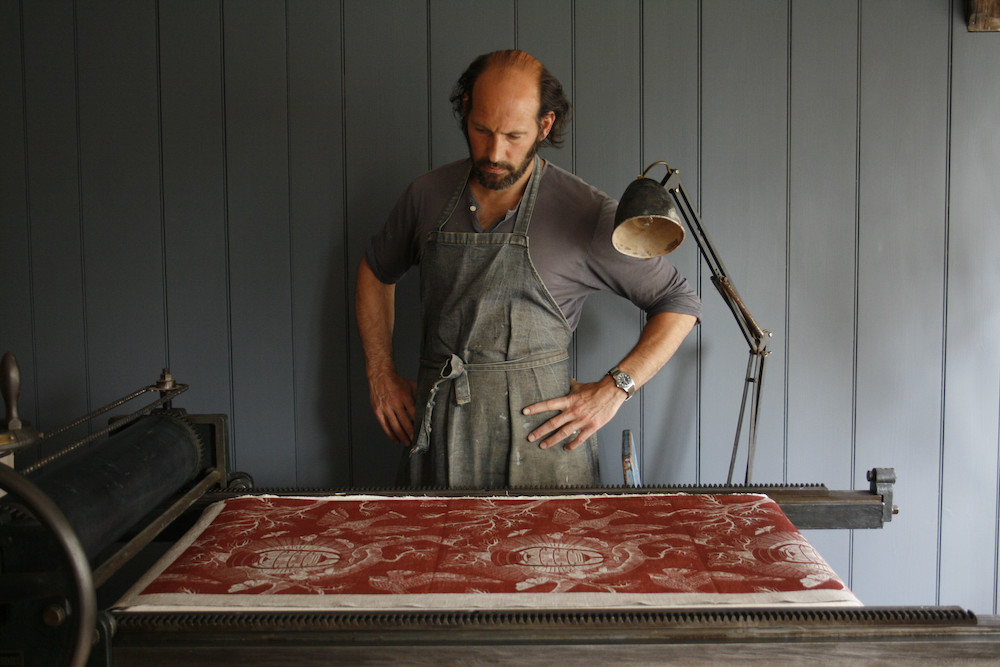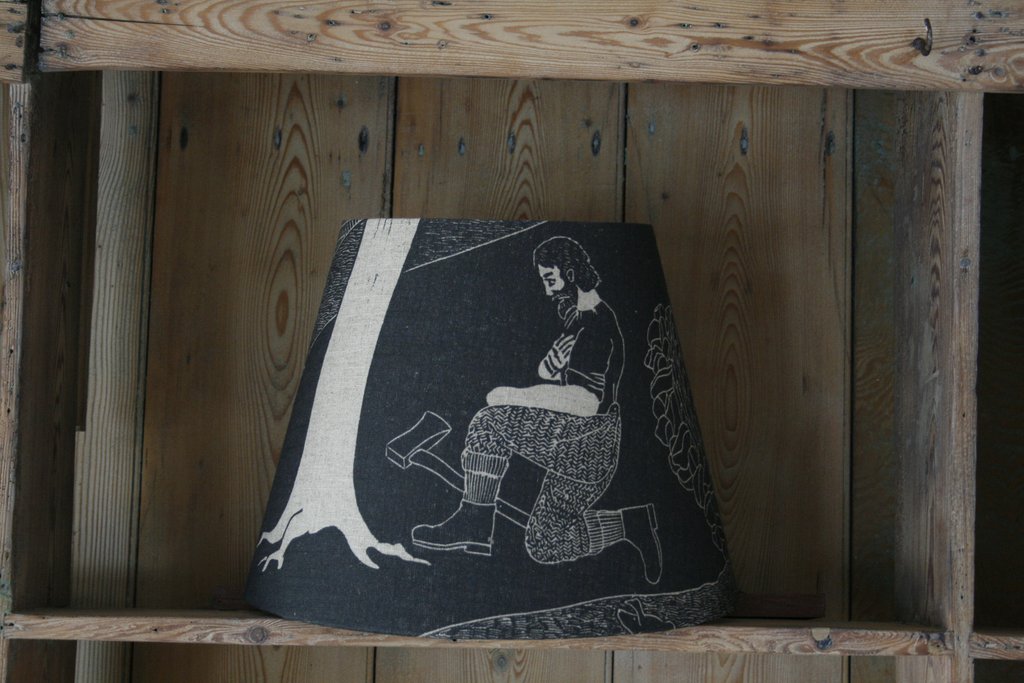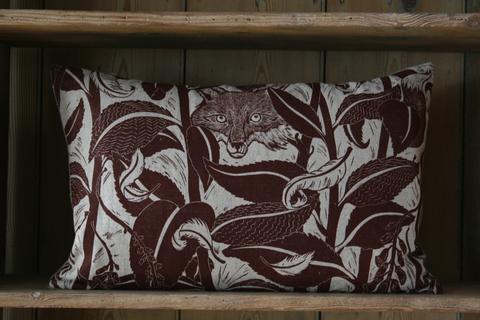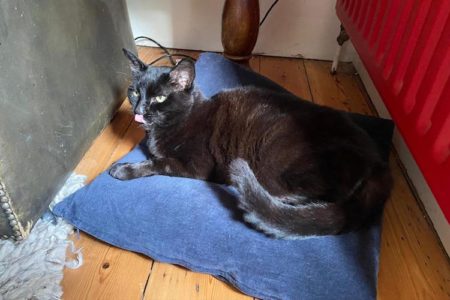Cameron Short: from London advertising creative to Dorset block-print designer

By Alice Austin
I’ve been fascinated with Cameron Short’s story since I first came across his work in 2013.
Cameron designs and produces block prints. Each intricate pattern is hand-carved onto traditional wood-printing blocks and digitally printed onto both paper and textiles. His deep affection for the English countryside is clear through his traditional approach to printing. Every design tells a story, seamlessly weaving fragments of pastoral folklore with ancient rural pastimes and narratives from the land.
As I dug deeper into Cameron’s background, I found that until a few years’ prior he’d been a senior advertising creative before deciding to quit his job in London and move to rural Dorset – with almost no experience of print-making.
With so many people working in office jobs that aren’t making them happy, I wanted to understand the logistics of how Cameron made the leap from the cut-throat world of corporate advertising to building a successful independent business creating hand-carved block-prints in rural Dorset.
Discovering print-making
Cameron tells me that it all began when, still in the advertising industry, he stumbled across an article about a print-maker called Marthe Armitage. Marthe hand-draws her designs and hand-prints them onto fabric or wallpaper from lino blocks.
“I loved what she did, how she did it and I saw a potential in block-printing. I thought it was a very gentle process with integrity, a genuine skill and a challenge and thought I might possibly be good at. So it germinated at the back of my mind.” Once Cameron had made up his mind to become a print designer, he arranged a kind of informal apprenticeship with Marthe which helped him springboard his own concepts.
Cameron stumbled across Marthe while he was at a crossroads in his career. Raised on a farm in in the depths of Hampshire, at 18 Cameron enrolled on a foundation course in art and design at Winchester School of Art and Design and was unimpressed with it.
“I felt a little lost after that because it was very conceptual and I didn’t feel like I was actually learning anything. I didn’t even do print-making on my foundation course, it was that conceptual; it was all about the idea. And I think they neglect the execution and that’s where the real interest is for me; having a great idea and executing it in a beautiful, arresting way.”
The world of advertising
After spending two years playing semi-professional rugby in the South of France for Aviron Bayonnais, Cameron returned to the UK. “At the time, we’re talking mid-nineties, TV commercials were really good. They were part of the national conversation. I thought it was worth looking into so I applied for a course at Watford College, fondly known as the Oxbridge of Advertising.”
As a coincidence Cameron’s twin brother had also applied to join the course. The pair became creative partners and, after graduating, spent about 8 months walking around London with their portfolio. They got their first job at an agency now known as TBWA in 1998 and spent the next 6 years working together as a creative duo.
“I loved the first few years I have to say. It was phenomenal.” But Cameron explains he hadn’t really factored in the banalities of office life. “You’re sitting at a desk all day. The first few years it didn’t bother me so much because it was all new and you’d be out of the office making the work.”
As the nineties rolled on the relationship between client and agency changed. There was a power shift within creative agencies and clients were much less decisive. Cameron describes laboring over a creative brief, just for the client to turn around and change the brief entirely.
Clearly Cameron’s real enjoyment from creative work comes from the execution of the idea as well as the concept itself; something that has become increasingly lost in the digital realm. When Cameron asked one of his old advertising buddies about the last time he was briefed for a poster campaign he laughed and said “about 7 years ago Cam.”
Cameron shares my personal gripe with the world of agencies; the constant race to stay as late in the office as possible just to be seen. “I just really loathed and resented the pressure to be seen in the agency almost 24 hours a day – to stay late and then stay on and have drinks. You know I had a life, I had a family, and even if I didn’t have a family I would have wanted time away from the office.”
Cameron continues “I went into advertising because I loved poster campaigns, I loved TV commercials, I loved well-written press ads. But these briefs became a rarity. I wasn’t happy, I was depressed. People saw me as a quite a successful creative. I’d won a few awards, I was a senior creative in a big agency, but I just couldn’t do it anymore. It was driving me mad and making me miserable. So I just resigned one day. I walked into my boss’s office and said for these reasons I’m resigning. That was it.”
Unless you’re one of the lucky few, quitting your office job is the stuff of dreams. Many of us mull over doing just that, but financial pressures, especially in the capital, means most of us never do it. And if financial pressure isn’t enough the sheer terror of being thrown out of our daily routine, unearthing our stability and entering the unknown is enough to scare us into staying put, however miserable we might be.
Cameron says “Something I will tell my kids is if you can’t deal with uncertainty in life you can become a prisoner. I felt that it wasn’t worth staying in advertising – it wasn’t making me happy. When I left my job, I knew I would go through a period of uncertainty. But if you can face that with some confidence, you’ll always find a way.”
“I guess what you’ve done, move to Berlin, that’s a leap of faith and it’s a brave thing to do. I’m sure it’s not easy but you’ll benefit from it hugely. It’s those people who stay and think it’s better the devil you know that aren’t really happy but keep on doing it. I don’t want to sound judgmental but I’d be wasting my life doing that. On to the next challenge.”
Moving to Rural Dorset
Cameron, his wife and their three kids live in the tiny village of Thorncombe in West Dorset.
“We ended up on this farm in a cottage. A draughty, dank cottage. There were two ladies who ran the place. They were real characters; you couldn’t make them up really. Dressed in rags, drips at the end of their noses, always had a fork in their hands, digging ditches to subvert the water from the house which came down the mountain. They’d been there since 1947 so they knew the land. They were great fun, they’re still good friends.”
With the idea of block-printing still at the back of his mind, Cameron was aware that he needed to adjust to his new surroundings.
“I spent about 6 months just working on the farm for nothing, just to get me outside. I learnt how to lay hedges which was great, which was very therapeutic; the polar opposite to advertising, where I was in an artificial box, sometimes windowless office. I found myself out in the wilds of West Dorset, manhandling hedgerows and learning an old rural craft. The pay was terrible but I came home happy.”
About three years ago Cameron and Janet moved out of that cottage to a derelict building which used to be the village shop. “There was no plumbing, no electrics, there were wild animals living in the house. It was weird because it’s in the center of the village – quite a well-kept village – but it was a monolith, covered in ivy.”
Cameron spent the next two years restoring the old building which has since become the family home and the headquarters of Bonfield Block-Printers. The shop was originally owned by the Bonfield family who ran Bonfield Supply Stores through the first half of the 20th Century. The building itself is Georgian; a cavernous space with barns that Cameron plans to use to run workshops and courses.
Reflections on the corporate world
Cameron has 3 young children who are growing up in a world driven to digital distraction. I ask how he envisions their future and whether he would support any interest they have in the corporate world.
“Happiness is a very odd term, really. I think contentment is a more grounded way of describing that state that we all aspire to have. I think advertising and urban life comes with many pressures, but it was office life that I found it excruciatingly challenging. So I wouldn’t actively encourage my kids to do it but if they really interested I’d make them aware of the realities of office life.”
Incredibly, Cameron’s twin brother took a path even farther removed from the advertising industry. Frustrated with his lack of resourceful skills, Ben Short also left the advertising industry and moved to rural Dorset to learn forestry. He’s now a woodsman and a charcoal burner, living in a 1920s wagon. Ben earns a living by selling logs during winter and burning coal during summer.
“To go from advertising to that, it’s poles apart. He really felt that desire, that need. He thought I’ve got one life, one go at this; I could sit here and carry on aiming to win awards and up my salary every year and be very wealthy and have a wonderful shiny life but, you know what, actually, I feel a bit empty. He wanted to get back to a simpler way of living in closer proximity to land and nature. So it’s totally doable, you just have to have the confidence and the ability to deal with the uncertainty.”
I explain to Cameron the reason why I started this zine, how I want to unearth the realities of modern life and normalize our shared problems and fears.
“Hopefully it’s helped, Alice. I’d encourage you to follow your heart, really. It’s old advice but it’s true.”
Wise words from a true creative.
Visit Cameron Short and Janet Tristram’s website.
And follow Bonfield Block-Printers on Instagram.






